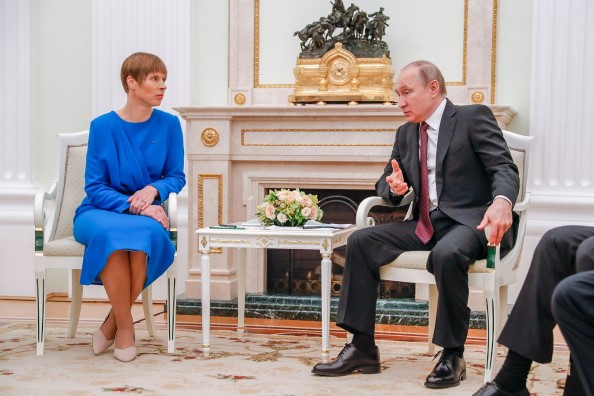The relationship between the Baltic states and Russia has always been complicated. No sitting Russian president has ever made an official state visit to Estonia, Latvia or Lithuania, and meetings between their heads of state are rare.
After Russian aggression in Georgia in 2008, many governmental forums between the Baltic states and Russia were suspended. Relations have gone further south following the Russian occupation of Crimea in 2014, and the Baltic states are among the strongest supporters of sanctions against Russia for its behavior in Ukraine. In a recent global survey conducted by IRI in partnership with the French think tank Fondation pour l’Innovation Politique (Fondapol), 80 percent of Estonians ,74 percent of Lithuanians, and 66% of Latvians reported serious concerns over Russia’s posture on the international stage.
In April, Estonian President Kerstin Kaljulaid made news when she visited Moscow to reopen the newly renovated Estonian Embassy. During her visit, Kaljulaid met with Russian President Vladimir Putin — the first meeting between the presidents of the two nations in nearly a decade. Among other things, the presidents discussed Estonia’s candidacy for the position of a non-permanent member at the UN Security Council, an important position for a nation of 1.3 million people. As the Estonian Foreign Minister Urmas Reinsalu told ERR News, “If we succeed, [it] will help further increase Estonia’s international prominence and regional influence.” As a permanent member of the UN Security Council, Russia was seen as having significant sway on the outcome of the vote for Estonia’s bid in the UN General Assembly. In June, Estonia finally got the seat and will assume its two-year term in January 2020.
Although viewed as a successful visit by the Kaljulaid administration, Lithuanian and Latvian leaders were not so enthusiastic about the optics of the Kaljulaid-Putin Moscow meeting. As Lithuanian Foreign Minister Linas Linkevičius put it, “It’s always more effective when we usually coordinate things and act in a more united way […] as there will always be attempts to divide us and test the unity of European countries or the Baltic countries.” The Latvian Foreign Minister Edgars Rinkēvičs, in a less direct manner, said that currently there are no issues that need to be dealt with Russia on the presidential level.
The unity of the Baltic states is a regular target of Kremlin propaganda, and pro-Kremlin voices quickly jumped on the train this time in an attempt to stoke divisions among Baltic leaders and publics. They touted the Estonian president’s leadership, claiming that the visit showed that Kaljulaid put national interests first instead of listening to Western governments. The portal Sputnik Latvia ran a story headlined “Estonian Example Tempts Latvians and Lithuanians to Fight for Putin’s Attention.” In the article, political analyst Vladimir Kornilov, a frequent guest on the state-run Russia Today, argued that Riga and Vilnius will now be vying for who gets an audience with Putin first. Writing in the Free Press portal, Sergey Orlov questioned the wisdom of Latvian diplomacy, claiming that while Estonians are willing to talk, Latvia is influenced by NATO’s “propaganda lens.” The portal Baltnews ran the article “Will Estonia Lead the Baltics?” It quoted Russian Ambassador to Lithuanian Alexander Udaltsov on what he considers as the self-inflicted economic woes of ignorant Lithuanian government policies. If only Lithuanians cooperated with Russia, which he insists has always shown a willingness to talk, bilateral relations would improve.
Widespread throughout Russian media was an article by a Polish far-right, pro-Kremlin blog “Myśl Polska,” which shows the type of voices the Russian media are prepared to promote back their negative portrayal of the Baltic states. The author of the blog is a well-known Putin sympathizer Mateusz Piskorski who was a part of the international “observers” team during the Crimea referendum. According to Piskorski, “Pragmatism is defeating Russophobia in the Baltics,” giving the examples of Kaljulaid’s meeting with Putin and the meeting in Riga between the Latvian foreign minister and deputy foreign minister of Russia in 2017. The word “pragmatisms” was often used by the Russian media to indicate that improved relations with Russia are in the national interest and that “anti-Russian hysteria” is hurting the economies of the Baltic States.
Given such media coverage, it is hardly surprising that polls regularly show that the Russian public considers the Baltic states among the most unfriendly toward Russia.
The coverage of Kaljulaid’s Moscow visit provides useful insights into the thinking of the Russian media. The media are there to legitimize the Kremlin’s policies, push narratives that favor an aggressive, paternalistic attitude toward the Baltic countries.
Engaging policymakers is a key pillar of IRI’s Beacon Project. When elected and government officials are informed on the narratives that surround their official visits, they are better equipped to respond to such attacks. IRI works in the Baltics with policymakers at all levels to provide credible research to inform their actions and responses.
Top
